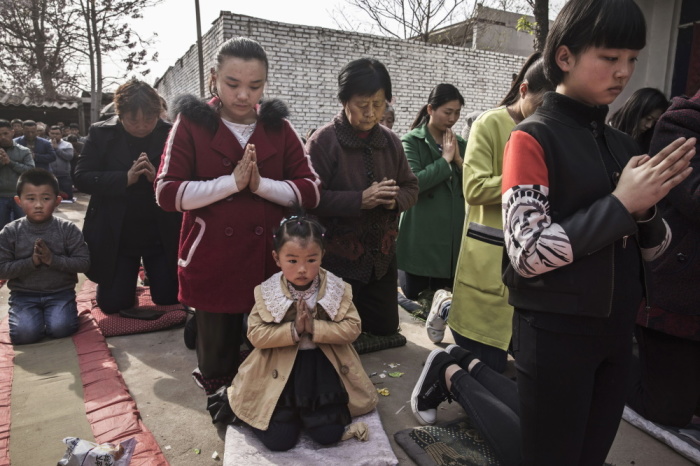'Persecuted even after death': China bans Christians from holding religious funerals

Christians across China are prohibited from holding religious funerals for their deceased loved ones as the Communist Party continues to tighten its grip on the regulation of religion and religious activity.
Bitter Winter, a magazine documenting human rights and religious freedom abuses in China, reported that authorities throughout the country are enforcing policies that prohibit religious customs and rituals to be used during funerals.
In December, the government of Wenzhou city’s Pingyang county in the eastern province of Zhejiang adopted the Regulations on Centralized Funeral Arrangement.
Under the new rules, “clerical personnel are not allowed to participate in funerals,” and “no more than ten family members of the deceased are allowed to read scriptures or sing hymns in a low voice.”
The new rules aim to “get rid of bad funeral customs and establish a scientific, civilized, and economical way of funerals.”
Similarly, a village official from the central province of Henan told Bitter Winter that the local government convened a meeting for religious work assistants in April, informing them that all religious funerals are restricted.
Soon after, officials issued a document stipulating that clerical personnel should be “timely stopped from using religion to intervene in citizens’ weddings and funerals or other activities in their lives.”
In Wuhan, police stormed the funeral of a Christian member of a government-regulated Three-Self Church and arrested her daughter, who was praying for her mother at the time. The daughter was only released after the deceased was buried without Christian rituals two days later.
Last April, officials broke up an 11-person Christian funeral in the province of Henan that was honoring a deceased member of the congregation. Officials accused attendees of “hiding” their actions in the countryside and threatened them with jail time. The police registered the personal contact information of the attendees and told them that they could be investigated at any time.
“When my father died, village officials threatened to arrest us if we didn’t conduct a secular funeral. We did not dare to go against them,” a villager from Gucheng town in Henan’s county-level city of Yuzhou told Bitter Winter.
“My father had been a believer for several decades. He is persecuted even after death.”
The crackdowns on religious funerals are part of the government’s campaign to “sinicize” religion, or bring it into unity with Communist Chinese culture.
In recent years, China has destroyed churches, burned down crosses, restricted religious expression online, and have attempted to rewrite the Bible and hymns so that the message reflects the Communist Party's ideology.
Beginning in February, the government plans to implement harsh new measures requiring all religious personnel to support and implement total submission to the CCP.
The “Administrative Measures for Religious Groups,” which consists of six sections and 41 articles, will control every aspect of religious activity within China and will complete the "Regulations on religious affairs" revised two years ago and implemented on Feb. 1, 2018.
“Religious organizations must adhere to the leadership of the Chinese Communist Party, observe the constitution, laws, regulations, ordinances and policies, adhere to the principle of independence and self-government, adhere to the directives on religions in China, implementing the values of socialism,” says Article 5 of the new policies.
Persecution watchdog group International Christian Concern warns that the latest measures will be used by the Communist regime as a ”legal tool to further tighten space for religious groups.”
At a press conference earlier this month, David Curry, CEO of persecution watchdog group Open Doors USA, warned that the “greatest threat,” in his opinion, to human rights worldwide is China, which rose in the rankings from No. 27 to No. 23 in the 2020 report.
Curry stressed that the implications lie in China’s development of surveillance to control its people.
“Its implications are not just for Christians within China but for every country and for religious freedom generally,” Curry said. “Let me put it together. It is like a puzzle. The pieces are there but it is not until you put it together that you see it clearly. When you see it clearly, it is frightening.”
“I saw with my own eyes the surveillance on the street but also in the churches, watching their congregation,” he added. “Facial scans when you come in and then tracking you and generating reports [with] assumptions built into their artificial intelligence system that is tracking Christian behavior.”
Curry said that the more often a person is seen going to church, the more often they are to be labeled a “radical.”
“They are shutting down house churches at a massive rate — 5,596 churches shut down, many because they refuse to put surveillance cameras up to watch their congregation.”





























